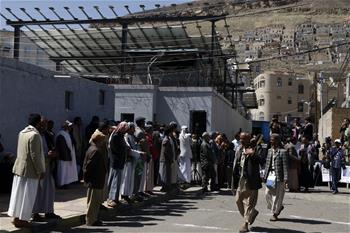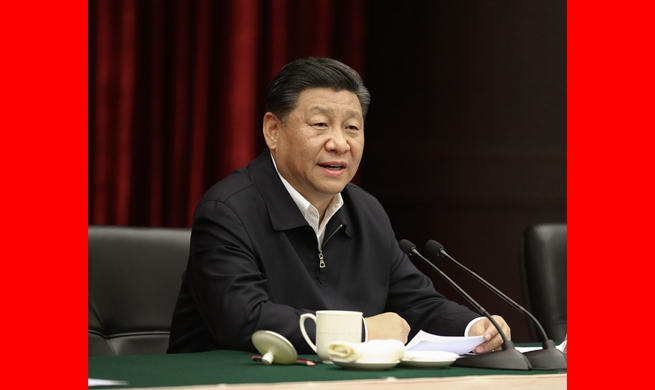MADRID, April 17 (Xinhua) -- Spain's political maturity will be put to the test in the general election which will be held on April 28 in the midst of an increasingly complicated political panorama.
This will be Spain's third general election since 2015, highlighting the political uncertainty in a country where opinion polls predict another hung parliament where five different parties could have a say in the formation of the next government.
According to the majority of recent opinion polls, the center-left Spanish Socialist Party (PSOE) will win the elections, followed by the right wing People's Party (PP), Ciudadanos (center-right), the left wing Unidos Podemos and the extreme right wing party Vox.
However, polls also predict that no single party will get close to an overall majority, meaning the next government will almost certainly be a coalition, although it is still difficult to say whether either the left or right wing block will win enough seats to be able to form a government in the 350 seat Congress.
"Everything depends on the political class. The times of single party governments are over and we will have to prepare for a time of alliances or coalitions," Pablo Martin de Santa Olalla, a professor at the Universidad Europea de Madrid explained to Xinhua.
The Vice-Deacon of the Universidad San Pablo CEY de Madrid, Ainhoa Arbizu, shared Martin de Santa Olalla's belief.
"It will be difficult to govern," she said. "Spain needs a change in its democratic culture to be like other European nations where it is easy to find governments made up of different parties. There is a custom in Nordic countries to invite all parties into the government in order to form a wide consensus," she added.
The elections held in December 2015 and June 2016 showed the difficulties of forming a government with the newly emerged four-party system (PSOE, Ciudadanos, PP and Podemos) but since then the political scene has changed with the eruption of Vox, which could further complicate matters after April 28.
The far right wing party led by a former PP member, Santiago Abascal, was virtually unknown a year ago, but its ultra nationalist, anti-immigration, anti-feminist and anti-abortion policies saw them claim over 10 percent of the vote in the elections for the Andalusian regional assembly held in December 2018.
The party's rise can in part be put down to the PP losing followers due to continued corruption scandals and also Ciudadanos' lack of clarity on certain social issues and a reaction to the problem of Catalan separatism.
"Vox is here to stay," warned De Santa Olalla, although the party's appearance need not necessarily strengthen the right wing.
Vox's arrival has further fragmented the right wing vote in Spain, with Vox, PP and Ciudadanos all fighting for the same political space and the same votes.
"There has been a change in the political model; left wing votes will mainly be for the PSOE, but those for the right will be split between three options and that is likely to damage them," explained the political analyst Rafael Barbera.
Another key in the elections will be the role of Basque and Catalan nationalist parties. Sanchez was able to gain their support in order to push through the censure motion which ended the government of Mariano Rajoy (PP) and make him Prime Minister at the start of June 2018.
Nevertheless the refusal of Catalan parties Junts per Catalunya and Esquerra Republicana to support his budget plans at the start of the year was the reason he had to call this general election.
There currently appear to be three possible scenarios for post electoral pacts after April 28th: the first of these is a coalition government made up of the PSOE, Unidos Podemos and Basque and/or Catalan nationalists; a three-way alliance between PP, Ciudadanos and Vox (such as that which now governs in Andalusia), or a pact between PSOE and Ciudadanos.
Although the numbers probably add up to make the third option possible, this looks to be the least likely outcome, after Ciudadanos leader, Albert Rivera commented he would not form a coalition government with the PSOE due to Sanchez's willingness to talk to Catalan and Basque nationalists.
This could harm Ciudadanos on April 28 if many prospective supporters consider a vote for Rivera's party to be the same as voting PP.
A good result for the PSOE, PP and Ciudadanos (and even Unidos Podemos) would maintain Spain's strong pro-EU stance in the face of Vox's eurosceptic views.
There is also a danger of 'election burnout' in Spain given that on May 26 the country will return to the polls to hold elections for local and regional authorities and also for the European Parliament.
"This is where the question of the 'useful vote' comes into play. It is possible that in the general elections people will vote for the traditional parties (PSOE and PP) thinking about the need for stability, but on May 26 they are more likely to follow their convictions," said Arbizu.
Whether or not this is the case, April 28 promises to be a key day in Spanish history, firstly because of all of the parties have young leaders, with Sanchez the only party leader to be born before the death of former Spanish leader, General Franco in 1975.
Secondly, the tone of the current election campaign has so far been based on tension and accusations, with very little focus on the actual policies the various parties will carry out if they win power.
Whoever finally forms a government will have the task of lowering the tone of the political debate in order to find consensus and lasting solutions to the country's current problems, such as the question of the Catalan region, rising inequalities in society and justice for the tens of thousands of victims of the Franco regime.
Thirdly, the Spanish economy is currently slowly, but surely recovering from the deep and long-lasting effects of the 2008 crisis and the country is expected to enjoy higher rates of growth over the next two years than other countries in the European Union.
Be there two parties or five parties jostling for power, Spain needs stability in order to ensure that this growth continues uninterrupted.
The 2008 crisis led to the rise of Unidos Podemos and Ciudadanos as alternatives to what many saw as an outdated two-party system. Vox's rise can also in part be put down to the crisis and any economic slowdown could open the door to further extremism and xenophobia.
April 28 will show whether Spain will choose stability or whether the country runs the risk of falling into the spiral of populism which has affected other countries in Europe. For that reason, this election is truly a test of political maturity.













